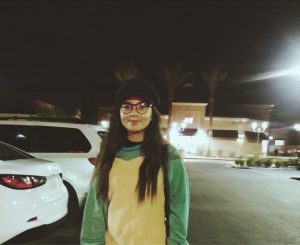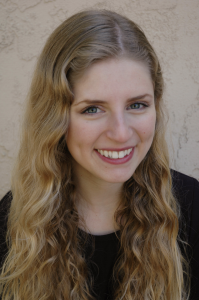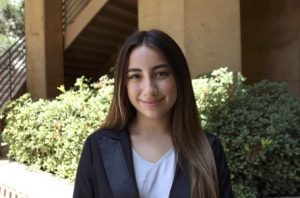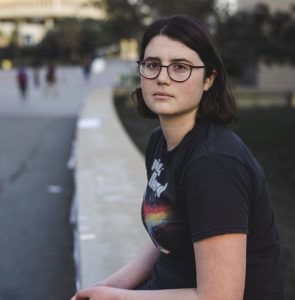Year of 2019
Please select from the options below to be redirected to the FAQ page. If none of these categories apply to you, please contact the student coordinator directly.
Quick Links
The following UTeach classes were taught during Spring 2019, under the leadership of Olivia Capizzi. Please click on one of the links below to be redirected to the course description of the course, including a biography of the instructor and class listing.
American Counterculture Movements
The History of Horror Games
History of Progressive Rock
The Making of Disneyland and SoCal
Mediums of Storytelling
Politics of Trust
Porn Generation
Science Fiction Studies: Origins, Obscurity, and Other Worlds
Shakespeare’s Sonnets
Spoken Word Poetry
American Counterculture Movements
Michelle Meza
Majors: History, Film & Media Studies
Biography:  My name is Michelle, I am a fifth year Film and Media Studies & History double-major with a minor in Chicano/Latino Studies. I have been fascinated by history for as long as I can remember. I can trace this fascination back to when I discovered the show Liberty’s Kids at the age of seven. The show is set in colonial America and I was immediately intrigued by how society evolved from the colonial period to present day, from the clothes, gender roles, and societal norms. My interest in cultural history developed early on, but I only realized it was something that I wanted to research last year after taking a California history class that covered the hippie movement in San Francisco. That class sparked my interest to research counterculture movements and their impact on American culture today. In my spare time I enjoy watching movies, discovering new music, and trying new vegan restaurants.
My name is Michelle, I am a fifth year Film and Media Studies & History double-major with a minor in Chicano/Latino Studies. I have been fascinated by history for as long as I can remember. I can trace this fascination back to when I discovered the show Liberty’s Kids at the age of seven. The show is set in colonial America and I was immediately intrigued by how society evolved from the colonial period to present day, from the clothes, gender roles, and societal norms. My interest in cultural history developed early on, but I only realized it was something that I wanted to research last year after taking a California history class that covered the hippie movement in San Francisco. That class sparked my interest to research counterculture movements and their impact on American culture today. In my spare time I enjoy watching movies, discovering new music, and trying new vegan restaurants.
Course Description: What are counterculture movements and how have they influenced American culture? Why did these movements emerge when they did? Students enrolled in this course will learn the answers to these questions and others by examining the historical and socio-political contexts that shaped the emergence of countercultures during the twentieth century. We will pay special attention to the counterculture ideology, music, and fashion through analysis of song lyrics from artists like Bob Dylan, films, and novel excerpts. By the end of this quarter, students will understand the ideologies and practices that these movements opposed. Students will also learn mainstream society’s reception of these movements during their respective periods. The counterculture movements that will be discussed include beatniks, hippies, and punks.
Enrollment Information:
Time: Tu 1-1:50pm
Place: DBH 1420
Course Code: 87639
Faculty Mentor: Dr. Andrew Highsmith
Back to Top
The History of Horror Games
Nazely Christina Jasmen Hartoonian
Major: Economics
Biography: My name is Nazely Hartoonian and I’m a senior majoring in economics. I’m currently the Director of Productions for UCI’s Video Game Development Club, an organization dedicated to helping undergraduate students make game design thrive! I’ve developed over six games with the club and have gained many friends throughout the process. I also host workshops to help ambitious underclassmen with team communication, time management, scheduling and scoping.
I’m working with Informatics Professor Bonnie Ruberg in researching more about gender studies and gaming, more specifically the impact of presented character gender on player performance. I am due to present my findings in May 2019 at UCI’s UROP Symposium.
Horror games and I go way back! My first horror game was Silent Hill for the PlayStation and though it scared me half to death, it was an exhilarating experience and I was instantly hooked. Some of my favorites at the moment are The Last of Us, Silent Hill 2, Resident Evil 7, and Haunting Ground.
P.S. I’m a dog lover! I have a 12-year-old Labrador retriever named Lucky and a 13-year-old pitbull named Kujo. They’ve been my best friends since middle school.
Course Description: Lurking in the shadows of old arcades lie nostalgic yet terrifying games like Chiller and The House of the Dead. What are some of the inspirations behind these classics and other frightfully memorable games like Silent Hill 2 and Resident Evil? The first five weeks of this seminar cover the origins of horror games from their introduction in the early 1980s to their solidification as an integral genre in the gaming industry today. We will discuss milestone games of each decade, why they succeeded and how they contributed to the popularity of the horror game genre. The last five weeks will focus on analyzing games—their themes, imagery, messages—as well as the subgenres of horror games. Namely, we will cover the importance of sound, environment and enemy design, narrative, pacing and aesthetics. We will define the many subgenres of horror that have emerged in the last 20 years including survival, psychological, folklore and action horror and examples of each subgenre.
Enrollment Information:
Time: W 9:00-9:50am
Place: DBH 1422
Course Code: 87637
Faculty Mentor: Professor Bonnie Ruberg
Back to Top
History of Progressive Rock
Alen Ashikian
Major: Business Administration
Biography: 
Hello! My name is Alen and I’m a second year Business Administration major, with an emphasis in Marketing. As you can see, my area of study has absolutely nothing to do with my course; I’m just really passionate about progressive rock music! I’ve been collecting vinyl records since high school, and since then my room has steadily been shrinking as Pink Floyd & Yes albums overflow off the shelves and onto the floor. The introductory music courses I’ve taken here at UCI went into classical, jazz, and rock n roll. However, I was surprised that they didn’t really touch upon progressive rock, which combines all three genres. It seemed like the perfect kind of music to put under a microscope. So last spring, I Googled something along the lines of “teach your own class UC Irvine” and… well here you are, reading my bio and course description! That being said, I’m really excited to share my enthusiasm for this topic with you this spring!
Course Description: “I always say that it’s about breaking the rules. But the secret of breaking the rules in a way that works is understanding what the rules are in the first place.” – Rick Wakeman, keyboardist
In this course we will learn about Progressive Rock, a style of music that was popular especially in the 1970’s. It is characterized by its classical & jazz influences, heavy use of keyboard instruments, and lengthy compositions. We will examine the genre’s history and development from the 1960’s through the 1980’s, with a focus on its relationship with technology, as well as its shifting level of popularity with audiences and the music industry.
By the end of the course, you should have a general understanding of what Progressive Rock is, how and why it changed over time, and understand how it has had a lasting influence on the popular music of today.
Enrollment Information:
Time: W 3:00-4:20pm
Place: DBH 1422
Course Code: 87632
Faculty Mentor: Dr. Amy Bauer
Back to Top
The Making of Disneyland and SoCal
Chase Robinson
Majors: History, English with Specialization for Future Teachers
Biography: 
*in Mickey’s voice* Hiya pal! My name is Chase Robinson and I am a fourth year double majoring in History and English, with a specialization in Future Teaching and a minor in Art History. As you can probably tell based on my course topic, I am a kid at heart. Since I was little, the Disneyland Resort has captured my attention and imagination. I fondly remember visiting Walt Disney’s original Magic Kingdom with my very first annual pass—experiencing its thrilling attractions, beloved characters, and picture perfect moments alongside my family. Upon entering UCI, I was able to merge my interests in history, popular culture, and Disneyland through my Humanities coursework. While Walt’s famous theme park all started with a mouse, my seminar was birthed from my own upper-division history research project entitled “From Main Street USA to the SoCal Way: Disneyland and its Role in Shaping the Southern California Fantasy, 1955-Present Day,” which I had the privilege of presenting at UCI’s Fourth Annual Undergraduate History Conference. If I am not at Disneyland, you can probably find me tutoring in the Writing Center, watching my favorite reality TV show RuPaul’s Drag Race, or taking #aesthetic Instagram photos at a museum near you. Ultimately, Disneyland is my Happy Place and I am beyond ecstatic to share my knowledge on the park and its surrounding SoCal area with you. To all who come to this happy class, welcome!
Course Description: On July 17, 1955, Anaheim, California became the home for faith, trust, and pixie dust when creative mastermind Walt Disney opened the gates of his unprecedented theme park, Disneyland. After spending more than two decades on planning, $17 million on financing, and energy on combating professional skepticism, the Man Behind the Mouse successfully carved his world-renowned Magic Kingdom out of a 160-acre orange field. In this course, we will explore the history of Disneyland and the history of Southern California, focusing on how Walt Disney’s world-renowned theme park influenced SoCal and vice-versa. The course’s topics include, but are not limited to: Disneyland’s opening day, the park’s themed lands and their significance, Anaheim’s municipal development, working at the Disneyland Resort, and Disney fan culture. Ultimately, we will treat “the Happiest Place on Earth” as not only a site of fleeting entertainment, but also as an entry point into Southern California’s infrastructural design, commercial development, and greater social character.
Enrollment Information:
Time: W 2:00-3:20pm
Place: DBH 1420
Course Code: 87638
Faculty Mentor: Dr. Allison Perlman
Back to Top
Mediums of Storytelling
Olivia Capizzi
Majors: Music, Psychology and Social Behavior
Biography: 
Hello! I’m Olivia Capizzi, and I am a fourth year double majoring in Music and Psychology & Social Behavior with a minor in Linguistics. I am a guest voice teacher for Segerstrom High School through the Creative Connections program here at UCI. I love playing the drums, singing, watching too much tv, and playing with my two dogs. Throughout my time as a music major, I have taken several classes involving musical analysis, and I found a love for analyzing how music contributes to storytelling. I have always had a passion for reading and other media, and developing this seminar has given me a chance to explore in depth the ways in which different mediums and art forms portray stories. This is a subject very close to my heart, and I’m very excited to share it with you all spring quarter!
Course Description: “After nourishment, shelter, and companionship, stories are the thing we need most in the world.” – Philip Pullman. This seminar will explore the ways in which writers and artists utilize their different mediums in order to tell stories. We will focus on storytelling in its many forms: film, music, literature, dance, and more. We will study stories that have been adapted across mediums in order to gain an awareness of the conventions of each genre and to discuss the changes that occur with each retelling of a story. The course will go over several stories, but will focus on the core texts, Cinderella and Romeo and Juliet, for two main reasons: they are well known enough for students to engage in discussion about them (but if you are unfamiliar with them, don’t worry!), and both stories have been adapted in many forms and genres over the years.
Enrollment Information:
Time: Th 11:00-11:50am
Place: DBH 1420
Course Code: 87635
Faculty Mentor: Dr. Seth Houston
Back to Top
Politics of Trust
Elizabeth Anuhea Hafen
Majors: Psychology, Political Science
Biography:
Hello my name is Elizabeth Hafen and I am a psychology and political science double major. I have combined both into political psychology and look at attitudes and behaviors of citizens and their impact on politics and vice-versa. I have conducted research on citizens of color’s trust levels towards government and their ability to do what is best for the country. I am currently doing research on undergraduate Latinas’ attitudes on the 2018 Brett Kavanaugh nomination hearings. I am also an At-Large Representative for the Student Center Board of Advisors where I ensure efficiency of the Student Center through recommendations. Although I enjoy spending most of my time involved in a form of politics, in my free time I like to play rugby, specifically flanker, here on campus. During my real real free time I like watching some YouTube videos or vine compilations. I am excited to share my love of politics with you all!
Course Description: Democracy am I right? As a society, people “entrust” their wellbeing to elected officials and to the government, but where does this “trust” even come from? Most importantly: what is “trust” and how does it affect contemporary politics? Can demographic variables such as age, gender, race, religion affect trust in elected officials? How have trust levels changed through the course of modern US history? And ultimately, how do these changes in trust affect the future of democracy? Students will leave this class having a better understanding of their own level of trust in political leaders and reflect on what has influenced them to have that relationship with elected officials.
Enrollment Information:
Time: Th 1:00- 1:50pm
Place: DBH 1420
Course Code: 87633
Faculty Mentor: Professor Caesar Sereseres
Back to Top
Porn Generation
Ava Bibi Shakib-Cocks
Major: Psychology and Social Behavior
Biography: 
My name is Ava Shakib-Cocks and I am a fourth year Psychology and Social Behavior major. I am the Vice President of the UCI club “Healthy Emotions and Attitudes in Relationships Today” (HEART @ UCI ) where we spread awareness and education on issues pertaining to healthy relationships, intimate-partner violence, and sexual health. I have a passion for, and am dedicated to, sparking conversations and researching topics related to the influence of technology and media on individuals’ gender expression and sexual practices. Aside from academics, I tend to spend my time being a yoga student and teacher, teaching piano, writing songs in my bedroom, and hanging out with my family and friends.
Course Description: In 2018, Pornhub had an average of 962 searches per minute, showing the prevalence and prominence of pornography in today’s culture and society. Now that pornography has moved into the digital world, anyone with access to the internet is able to browse limitlessly and anonymously. This course examines pornography and analyzes how it can act as a form of sex education in the twenty-first century. This course combines academic works in the fields of Psychology, Sociology, and Gender & Feminist Studies to help understand the influence of pornography on society’s and individuals’ sexual behaviors, preferences, and expectations regarding sex. We will explore topics related to the themes and attitudes that pornography can illustrate and teach to its viewers, feminist critiques on pornography and censorship, the effects of pornography on minority groups, porn addiction and mental health, and the incorporation of porn-literacy education into adolescent sex education. Curiosity and a desire to have intellectual conversations on this subject is the only “prerequisite” for this course. No prior experience in any of these topics is needed. All backgrounds are welcome and encouraged to enroll in this course.
Enrollment Information:
Time: W 1:00-1:50pm
Place: DBH 1420
Course Code: 87636
Faculty Mentor: Dr. Jennifer Terry
Back to Top
Science Fiction Studies: Origins, Obscurity, and Other Worlds
Elise Carter Hughes
Majors: English
Biography: 
Greetings and salutations, my fellow Anteaters! My name is Elise Hughes, I’m a third year English major and a twenty-first year human being. I’m the Founder and Captain of Anteater’s Guide to the Galaxy, UCI’s Sci-Fi club, where I wield my power to share spicy sci-fi memes with our edgy members.
I’ve been interested in science fiction since I was a kid, so I founded the club to share that interest with my peers. Through AGG, I noticed so many different perspectives on science fiction as a genre, how we use it to reimagine our past, explore hidden gems of the present, and predict, hopefully, a bright future. This year, I wanted to explore sci-fi, not only socially, but also academically. So, through the UTeach program, I bring to you Sci-Fi Studies: Origins, Obscurity, and Other Worlds.
Course Description: The genre of science fiction (SF) remains difficult to define, and is thus primarily characterized through certain recurring tropes, which, though diverse, share a combinative quality of the fantastical and the empirical. This course will attempt to track the origins of these tropes and conjecture why they have persisted into modern SF. To do this we will look back in history further than Mary Shelley and Jules Verne, assessing proto-science fiction, dating back even thousands of years ago. By analyzing this more obscure branch of sci-fi, students will discover how later reconfigurations of these tropes in the more popular and mainstream areas of the genre were created. The trope that will take center stage throughout this course (though we will analyze others) is the imagination of other worlds and what they reveal about the world in which they were dreamt of.
Enrollment Information:
Time: Tu 11:00-11:50am
Place: DBH 1420
Course Code: 87640
Faculty Mentor: Dr. Michael Rose
Back to Top
Shakespeare’s Sonnets
Maya Shalhevet Lyubomirsky
Major: English with Creative Writing Emphasis
Biography:
Hello! My name is Maya. I’m a fourth year English major. I plan to pursue a PhD in Literature in order to become a professor, so I can teach literature and other English-related classes in both universities and community colleges. I love to read and learn things from every subject! I also love music, nature, art, making new friends, hanging out with people, and enjoying spicy memes ( ͡° ͜ʖ ͡°) Academically speaking, my main interests are World Literature, Diaspora Literature, Jewish and Middle Eastern Studies, and Shakespeare.
Course Description: What do you think of when you hear the name “Shakespeare”? Do you think of Romeo and Juliet? Are you reminded of dull high school lectures and impossibly dense texts that seemed to be written in a foreign language? Maybe you wish you knew more about him, or maybe you hate him and don’t understand why anyone likes him, or why people think he’s such a big deal. Well, this might be the class that will change your mind!
Instead of analyzing his plays, we will be examining his lesser known, but no less important Sonnets. In this class, we will contextualize his sonnets in the historical period they were written, “translate” his language into modern English, discover the influence he had on literature, culture, and even the English language, and learn why Shakespeare is held in such high regard in the academic world. You might find that Shakespeare is understandable, relatable, and even enjoyable. At the very least, you will not be bored!
Enrollment Information:
Time: F 1:00-2:20pm
Place: DBH 1422
Course Code: 87631
Faculty Mentor: Professor Amy Gerstler
Back to Top
Spoken Word Poetry
Cindy Ung
Major: English with a Specialization for Future Teachers
Biography: 
Hello, hello! I’m Cindy Ung, and welcome to my humble abode called Spoken Word Poetry! I can’t wait to get to know all of you, but first, I will introduce a few things about myself. I love being super involved on campus—right now I’m a Community Assistant at Vista del Campo, a member of Circle K International, a board member of the English Majors’ Association, and a Campus-wide Honors student! I am also running my own poetry blog on Instagram called @moonlightforshort. Whew! Right now I’m a 3rd year majoring in English with a specialization for Future Teachers. I hope by teaching and getting to know my students, we all can leave the classroom with great memories and a newfound appreciation for spoken-word. If anyone wants to chat about poetry, yummy food places, rabbits (I have a 6-year-old Lionhead), or new board games, I’m your girl. Also, you’ll definitely hear me playing a lot of Oh Wonder songs during the beginning of my classes this spring quarter!
Course Description: Rupi Kaur’s “Milk and Honey” and Amanda Lovelace’s “The Princess Saves Herself in This One” are some of the many works of poetry going viral in today’s society. Meanwhile, poetry slams are entering the online world, with Youtube videos receiving over a million views and poetry blogs gaining thousands of followers. But what is the result of these changes? A rising genre of modern poetry called spoken-word! A term for poetry that is written to be performed, spoken-word originated from Harlem Renaissance poetry, Blues, and the Beat Generation of the 1960s. Now, poets travelling across the world are bringing spoken-word to the classroom and even to live events. In this course, students will explore spoken-word with a particular focus on poets from the Project VOICE team, including Sarah Kay, Andrea Gibson, Neil Hilborn, and other established poets. We will analyze the following: How is spoken-word empowering? What storytelling techniques do spoken-word artists employ? What is the relationship between audiences and the poet onstage? Students will also demonstrate their learning by performing their own spoken-word poem by the end of the quarter.
Enrollment Information:
Time: Th 4:00- 4:50pm
Place: DBH 1420
Course Code: 87634
Faculty Mentor: Dr. Carrie J. Noland
Back to Top
